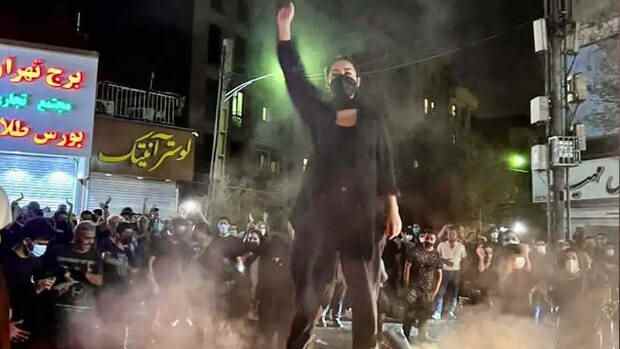Tel Aviv Demonstrations on the streets of Tehran, uprisings in the Iranian provinces, protests critical of the regime and provocations at the World Cup in Qatar: the mullahs’ regime cannot get the wave of protests under control. According to observers, dissatisfaction with the Islamic system has increased massively in recent days. Is the country on the brink of revolution?
According to eyewitnesses, civil war-like scenes took place in the Kurdish regions in the west and north-west. Dozens of people are said to have been killed, injured and arrested there. There are also said to have been deaths and numerous arrests in other parts of the country.
According to the Iranian judiciary, 40 foreigners have also been arrested in connection with the unrest. Among other things, they are accused of espionage, said justice spokesman Massoud Setajeschi on Tuesday.
According to demonstrators, security forces shoot indiscriminately at protesters or even drivers. Videos are shared on social media that are supposed to show such incidents. According to human rights activists, more than 430 people have been killed and around 17,500 demonstrators arrested since the system-critical demonstrations began in mid-September.
Top jobs of the day
Find the best jobs now and
be notified by email.
The regime believes that the uprising will soon be over, says a Tehran political scientist who wishes to remain anonymous. But it is wrong: “The demonstrations will not die down any time soon.” But those who reckoned with an imminent end of the regime would also be wrong. The rulers are also supported by the middle class, which has an economic interest in the existence of the Islamic Republic. In addition, “the security forces have not yet exhausted the potential of their brutal violence.”
Many Iranian women are now demonstratively doing without the prescribed Islamic headscarf in public.
(Photo: dpa)
According to the political scientist, the government has an advantage here. You don’t have to take criticism from Western politicians or human rights organizations into account. “The regime,” says the Tehran political scientist, “benefits from its global isolation.” The ayatollahs would praise that as “independence.” And the officers would fight “to the last drop of blood” for the survival of the regime: “Should the Islamic Republic implode, they too would perish with it because they had nowhere to go.”
Putin’s fate is crucial for Iran
Two factors could affect the regime’s survival. First of all, if the military can no longer pay for it, it would soon be over, says the political scientist, qualifying him: “But it’s a long way to get there.” ayatollahs. The two main buyers of Iranian oil, China and Russia, keep the regime alive with their dollar transfers.
The second factor is the course of the war in Ukraine. “If Putin doesn’t end up victorious, the end of the Islamic Republic is near,” says the political scientist. Economically and politically, Moscow and Tehran are closely linked. A defeat for Putin would also spur and encourage Iranian protesters. “Should Putin be overthrown,” says the expert, “the Islamic Republic would sooner or later come to an end.”
In the short term, however, Iranians’ attention is focused on the soccer World Cup in Qatar, which offers a stage for critics of Iran. A few dozen men, women and children wore T-shirts that read “Zan, Zindagi, Azadi” (Women, Life, Freedom) on Matchday 1. This is the slogan of the anti-regime movement in Iran.
Before Iran’s game against England, demonstrators outside Khalifa Stadium chanted “Say her name, Mahsa Amini” – in reference to the 22-year-old Iranian Kurdish woman who was arrested two months ago and died shortly thereafter.
Iran’s players did not sing their national anthem as a protest.
(Photo: IMAGO/Matthias Koch)
Since then, women and men have been taking to the streets across the country. They defy the security forces, who want to use violence to quell the wave of protests.
The captain of the Iranian team, Ehsan Hajsafi, was also critical: “The conditions in our country are not good,” he said. The people are “not happy”. Hajsafi, one of Iran’s most prominent kickers, is under contract with AEK Athens. It is not clear whether he will be able to return to Iran after this public criticism of the regime.
The fact that in Qatar, one of the few Arab countries with normal relations with Tehran, the Al Jazeera media company also publishes comments critical of the regime in prominent places shows how far the protests in the region go.
“My people in Iran are under a lot of pressure and being killed by the regime, so we want to take this opportunity to raise our voice for them,” said Mahmoud Izadi, one of the organizers of the protest. “The people who dance and cheer for Iran were sent here by the regime to paint a positive image of Iran,” Izadi said. He adds that he is not there to support the team “because the regime does not support our people”.
Elina, 32-year-old manager of an e-commerce company in Tehran, is confident of victory: “There is no way back,” she told Handelsblatt on the phone. Women have been oppressed in Iran for decades – “now we are fighting for our rights”.
More: US abandons efforts to revive nuclear deal with Iran
